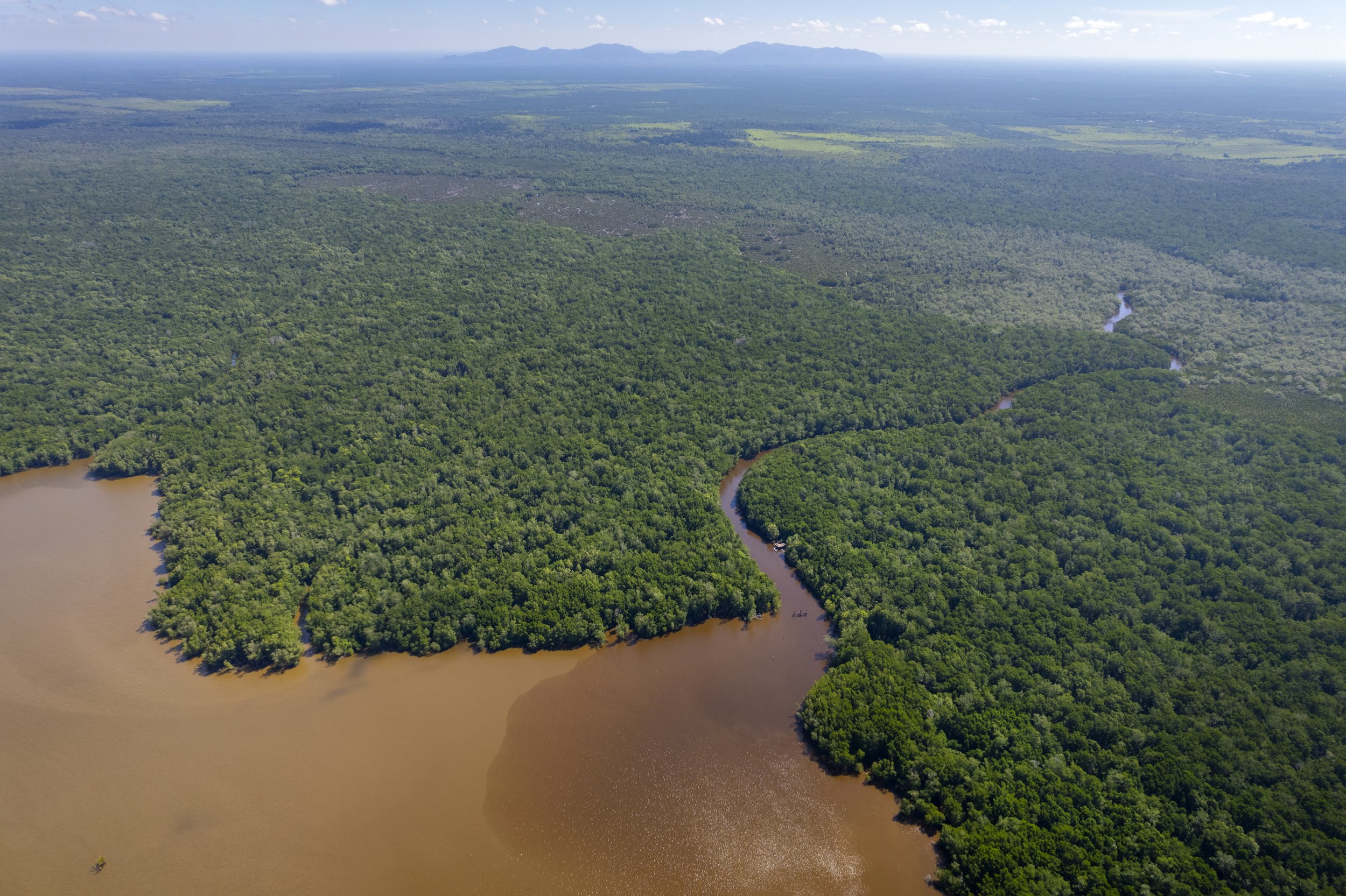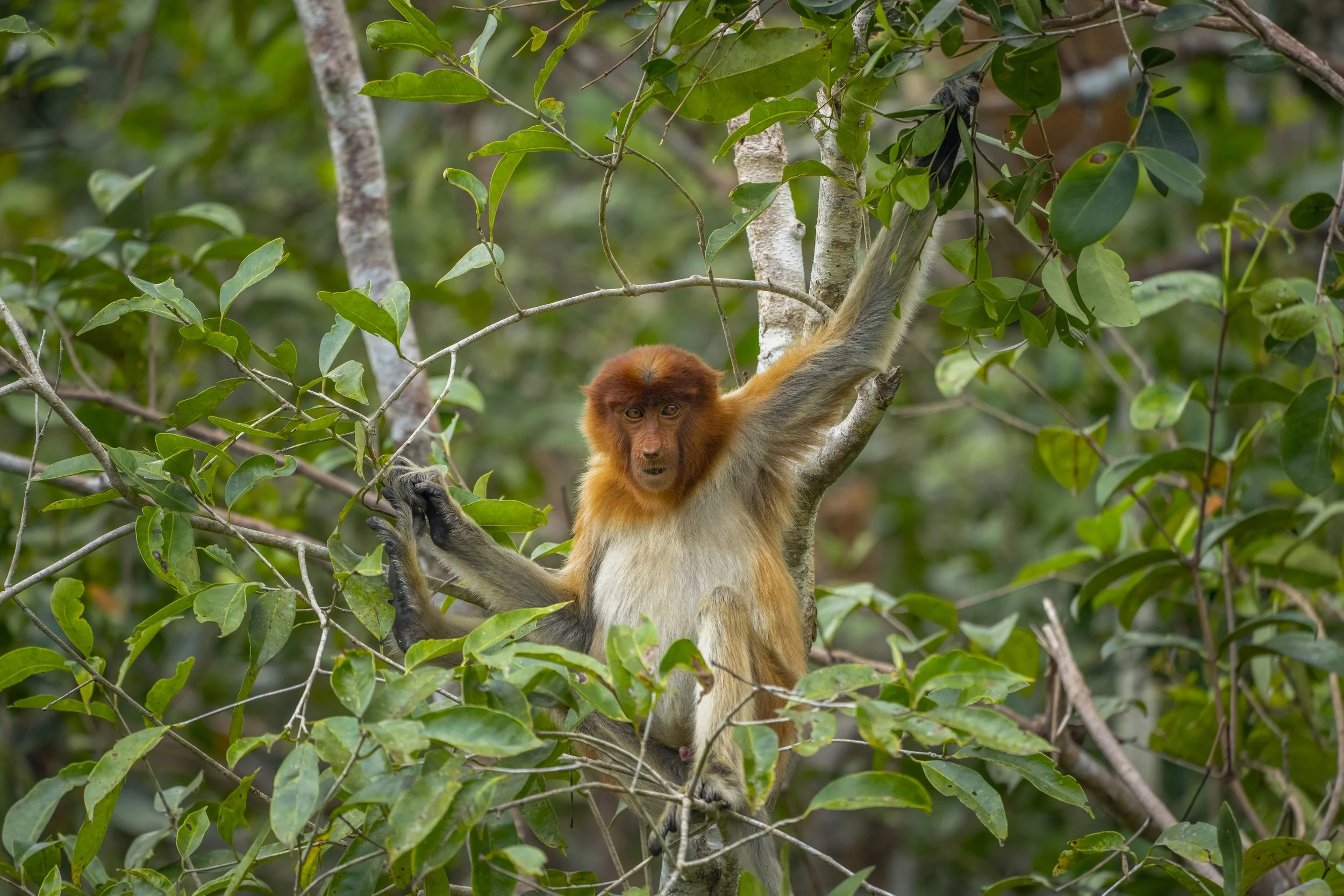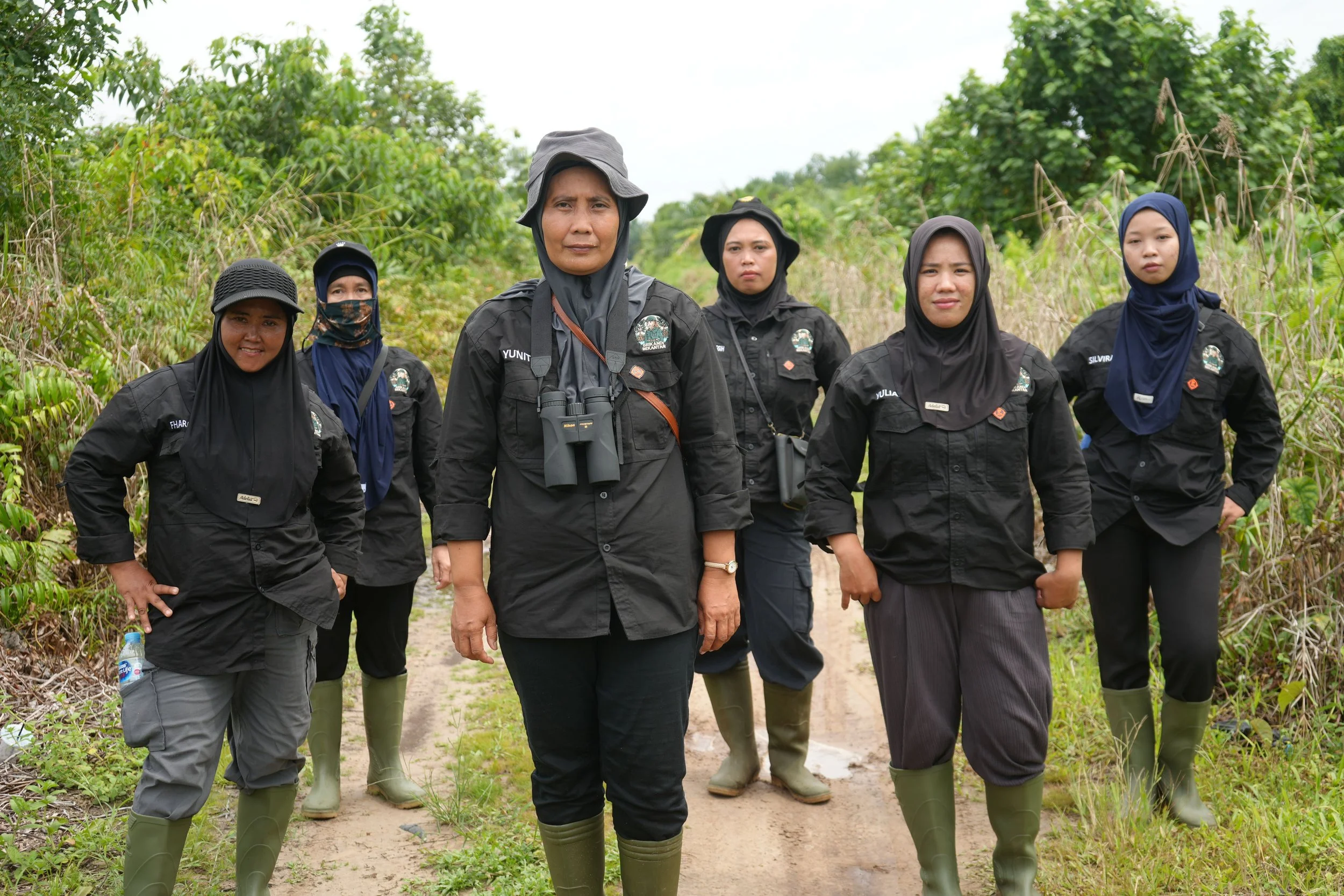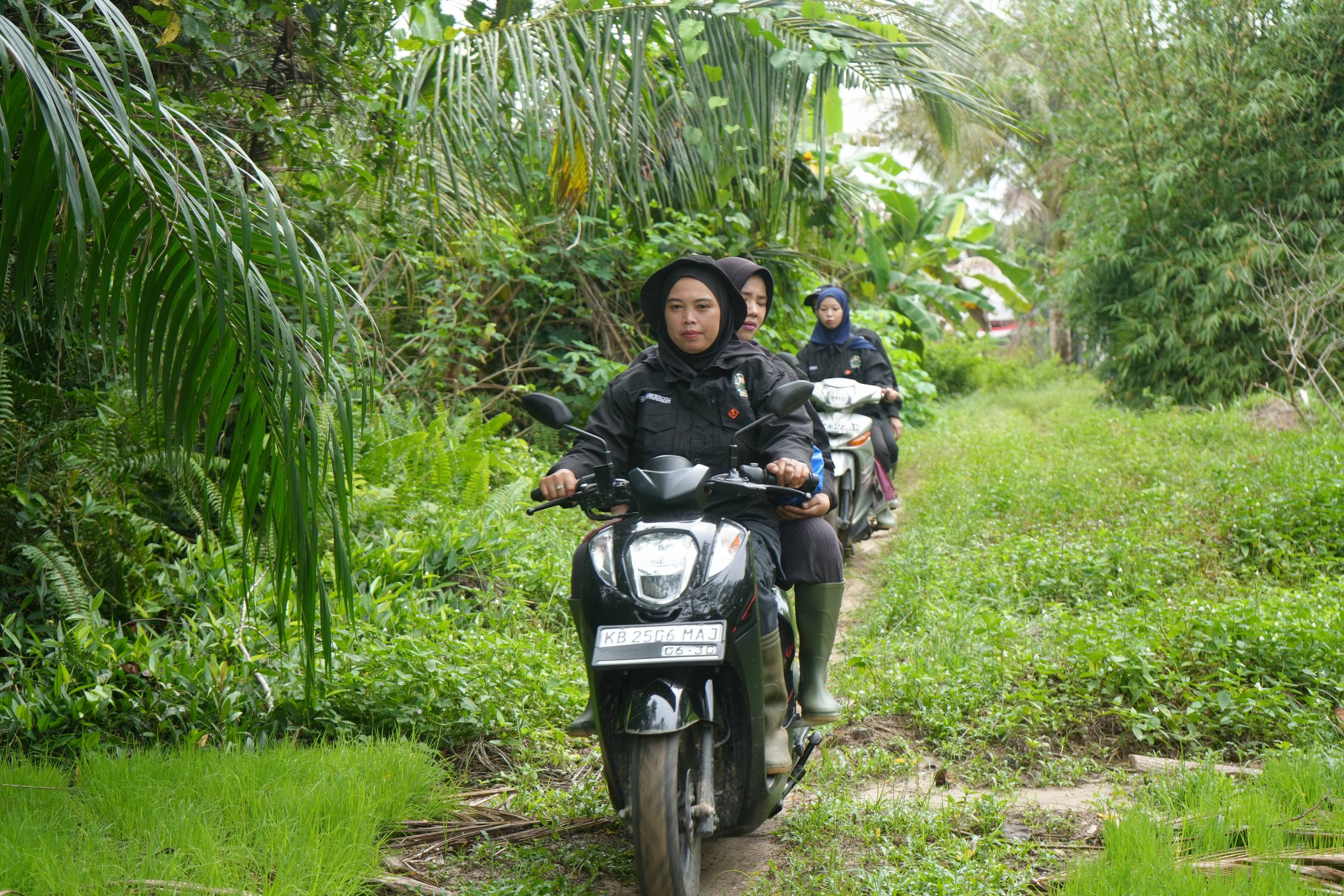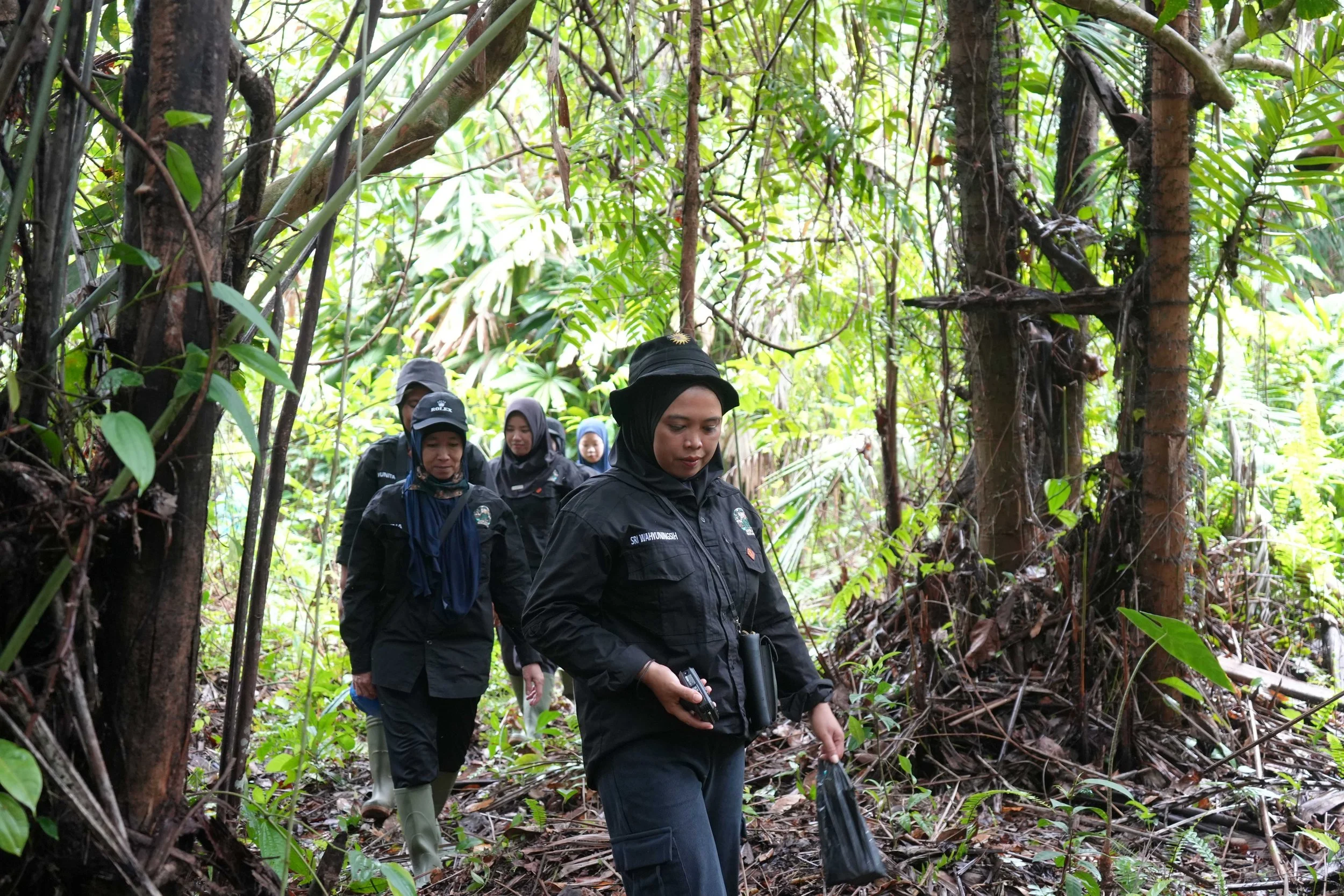‘My motivation to be a part of the patrol team is to protect the proboscis monkeys in my village.’
- Ibu Yunita, the leader of the women SMART patrol team
By Oka Pransiska, Ziva Justinek, and Adam Miller
Where the ‘Dutch monkeys’ swim roam
Mangrove and peat swamp forests make up over half of the area of the West Bornean coastal village Mengkalang Jambu. This adds up to less than 3,000 ha, yet community-led SMART patrols record the majority of the proboscis monkey encounters across Kubu Raya district here. Over the past five years, four SMART patrol teams in the district travelled a total of 5,118 km, the equivalent of the distance between Dublin and New York. In the past, these monkeys were seen as pests in certain areas, but with numbers plummeting every year, they became a symbol of pride and diversity in the region. Locally known as bekantan or monyet Belanda (Dutch monkey), a nickname rooted in colonial-era comparisons between the monkeys' long noses and those of the Dutch settlers, their distinctive features now spark fascination rather than mockery. The males’ prominent noses attract the females, likely due to amplified calls. Their hands and feet are webbed, making their remarkable swimming abilities unmatched in the primate world and allowing them to use rivers as paths to escape predators or move to other areas.
Mangrove forests along the West Bornean coastline.
Proboscis monkey (bekantan) in its natural habitat.
Endemic and Endangered
Proboscis monkeys (Nasalis larvatus) are the largest monkeys of Borneo (and Asia) and play an important role in maintaining forest health by dispersing seeds and aiding vegetation regeneration. They live in groups of up to 20 individuals with complex social dynamics, but show little concern for territoriality, and groups often gather and mix at sleeping sites by the river. Only found in Borneo, over the years their numbers have declined due to habitat loss, hunting, and, in certain areas, seen as a threat to local crops.
Vital conservation actions
Efforts to conserve the proboscis monkeys include direct habitat protection, promoting sustainable land-use practices, and creating protected areas. Community conservation initiatives are crucial, emphasizing the importance of communities in conserving their natural surroundings, which they, as well as the native species, depend on. In order for these efforts to turn into effective species conservation, strong local governance supported and amplified by sustainable livelihoods is critical. Communities’ authority to manage their natural resources paired with tangible benefits from conservation, such as sustainable livelihoods and equitable benefit-sharing, results in communities being able and eager to protect the habitats and wildlife. Good governance provides the base for inclusive decision-making, a sense of agency, and transparent enforcement, while livelihoods supply the incentive and stability for long-term stewardship. As a result, local ownership, trust, and resilience lead to lasting conservation outcomes.
Mengkalang Jambu’s governance and conservation path
The community of Mengkalang Jambu sought legal standing to protect the species and its habitats, while also gaining critical management rights over local fisheries found within the mangrove forests. In 2019, the village secured rights over 2,920 ha of mangrove and forested area through the social forestry scheme - giving frontline communities the legal standing to steward the ecosystem and protect the local bekantan population from extinction.
A community meeting in Mengkalang Jambu, where residents collaboratively shape local governance and conservation decisions.
This community is Planet Indonesia’s long-term trusted partner. The local community-led governance institution is one of the most advanced, and community support for forest and fisheries management is extensive. Since the start of the SMART patrols in 2020, the occurrence of illegal activities (i.e. land clearing, logging and poaching) has reduced drastically, effectively transforming former poaching grounds into near-zero poaching areas.
Moreover, the community has positive perceptions towards the proboscis monkeys and has hence expressed extreme frustration with the observations of poaching that started to re-appear in 2024. Last year, community members reported two poaching instances; one alleged perpetrator from a nearby oil palm concession poached four individuals, while later on, reportedly, individuals from the neighbouring Dabong village ‘sold the location’ of the monkeys to a group of hobbyist hunters from Pontianak who poached eight individuals. Community members also reported increased poaching earlier this year and note that the monkeys are getting harder to see and seem more scared. In addition, they are moving up into the village to avoid potential poachers and perhaps seek food sources in the peat swamp of the village.
The community-led SMART patrol teams use rivers to traverse the area and particularly focus on fisheries monitoring, while also recording animal observations. While this is crucial to enforce no-take zones for fisheries and village boundaries, proboscis monkeys’ feeding trips further inland go unmonitored and unprotected.
‘Why are only men expected to patrol?’
Oka, Planet Indonesia’s long-time team member, remembers this obvious question posed by women of the Mengkalang Jambu community early last year. With increased occurrences of poachers reaching the mangroves through the palm oil plantation labyrinth, there was an immediate need for the patrol expansion to the terrestrial-access areas.
Right: The river-based SMART patrol teams enter the mangrove forest (predominant, light green colour) inside the area with obtained tenurial rights (yellow border). Dark green patches represent the forest, while dark grey patches represent the peat swamp. Light grey are open areas, where forest has been cut down. The red border marks the exposed area where poachers can access the forest from the plantations and where the terrestrial patrols take place.
Left: Numerous rivers (in blue) serving as pathways for the river-based SMART patrols to monitor the inland area, but limiting access to the north-east edges.
It turned out that Ibu Yunita was not alone in these thoughts. Women in the community wanted to be actively involved in the monitoring and protection of the village forests. The village forest management unit followed up on this idea by organizing a joint group discussion on women’s rights regarding involvement in the direct management of the natural areas together with the village government, attended by 34 participants. Oka, passionate about women’s rights, facilitated the discussion.
Six women raised their hands.
The newly formed Srikandi Bekantan patrol team, led by women from Mengkalang Jambu.
‘We want to be a part of the women patrol team, we want to be directly involved in monitoring and protecting our forests, and we want to play a role in saving the wildlife of our village,’ Ibu Fharamita, another community member, echoed Ibu Yunita’s words. With Ibu Yunita as the lead, they formed the Srikandi Bekantan patrol team in July this year. Srikandi is a name taken from a Javanese traditional puppet theatre, referring to a princess or royal figure who represents strength, skill, courage, and equality.
After a two-day training in SMART patrol methods, wildlife protection and monitoring strategies, the Srikandi Bekantan patrol team headed out on their first patrol at the start of October this year. They jumped on their bikes and took over the inland village area, extending into the plantation mosaic.
Srikandi in Javanese wayang. Illustration by Raden Soelardi (KITLV 36C99). Licensed under CC BY 4.0.
Women patrol team members riding to their monitoring area.
They patrolled eight full days spread across the first month, starting at dawn and ending their days in the evening. ‘Their faces glowed with enthusiasm when they observed three proboscis monkeys in the community gardens on their first day!’ Oka smiles with pride. Despite the 2024 poaching events, the population still existed, giving the community a sense of hope that they could still protect the species for generations to come.
Then, on their third patrol that month, they encountered six bekantan, but they also met armed poachers. ‘My heart was pounding when I saw that person's rifle. It was hanging on his back!’ Ibu Yunita hastily told Oka. ‘They said they only came fishing, but they brought rifles instead of fishing rods,’ she added in an annoyed tone. Their uniforms and presence caused the men to leave this time. But the patrol team expressed the wish to deepen their capacity in how to approach dangerous situations such as this one.
The Srikandi Bekantan team conducting inland patrols.
Looking ahead at protecting the district’s stronghold for the species
‘The reaction of my husband and my children when I am protecting the bekantan was to support my decision,’ Ibu Silvira fondly told Oka, when asked how her family saw her new role. ‘I want my children and grandchildren to still be able to see proboscis monkeys in the future, not just me, today, ’ she added.
This local initiative and the growing enthusiasm behind it evolved into concrete steps for lasting protection. Recognizing that national laws often fail to deter local threats, community members initiated talks on peraturan desa (village-level regulation) in their village to further protect this species. This would increase sanctions and accountability, enforcing protection even with the outsiders.
In Mengkalang Jambu, community-led conservation efforts are showing promise through expanding patrols, involving women in protection roles, and implementing locally-relevant regulations. Key to the long-term success of these conservation efforts is continued community involvement and ownership through governance linked with secured livelihoods and tenurial rights, as well as further conservation actions, particularly targeting the survival of monyet Belanda in the area.
Special thanks to Blue Action Fund for this support.
If you have any questions please reach out via admin@planetindonesia.org. Sign up for our newsletter and follow us on our social media Facebook here, Instagram here, and LinkedIn here to get timely updates on our activities, an insider’s look into the lives of front-line conservationists, and ongoing programs.

